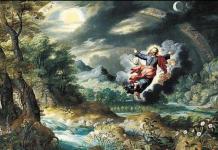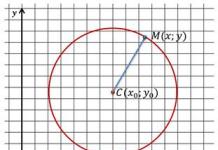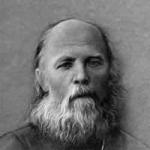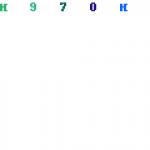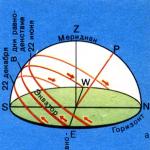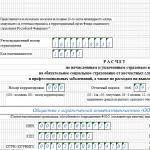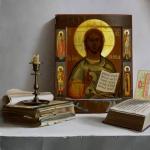Since man became intelligent, he began to look for answers to questions about who created everything that exists, about the meaning of his life, and whether he is alone in the Universe. Not finding an answer, the people of antiquity came up with gods, each of whom was in charge of his own part of existence. Someone was responsible for the creation of the Earth and Sky, someone was in charge of the seas, someone was in charge of the underworld.
As we learned about the world around us, there were more and more gods, but people never found an answer to the question about the meaning of life. Therefore, many old gods were replaced by one God the Father.
Concept of God
Before Christianity appeared, people lived for several thousand years with faith in the Creator, who created everything that surrounds them. This was not a single god, since the consciousness of ancient people could not accept that everything that exists is the creation of one creator. Therefore, in every civilization, regardless of when and on what continent it arose, there was God the Father, who had assistants - his children and grandchildren.
In those days, it was customary to humanize the gods, “rewarding” them with character traits characteristic of people. This made it easier to explain natural phenomena and events taking place in the world. A significant difference and clear advantage of the ancient pagan faith was that God manifests himself in the surrounding nature, and therefore was worshiped. At that time, man considered himself one of the many creations created by the gods. In many religions there was a principle of assigning the appearance of animals or birds to the earthly hypostases of gods.
For example, in Ancient Egypt, Anubis was depicted as a man with the head of a jackal, and Ra - with the head of a falcon. In India, the gods were given images of animals living in this country, for example, Ganesha was depicted as an elephant. All religions of antiquity had one feature in common: regardless of the number of gods and the difference in their names, they were created by the Creator, who stands above all, who is the beginning of everything and has no end.
The concept of one God
The fact that there is one God the Father was known long before the birth of Christ. For example, in the Indian Upanishads, created 1500 BC. e., it is said that in the beginning there was nothing but the Great Brahman.
The Yoruba people living in West Africa say that in the beginning everything was watery Chaos, which Olorun turned into Earth and Heaven, and on the 5th day he created people, fashioning them out of the earth.

If we turn to the origins of all ancient cultures, then in each of them there is an image of God the Father, who created all things together with man. So in this concept, Christianity would not have given anything new to the world if not for one significant difference - God is one, and there are no other gods besides Him.
Strengthening this knowledge in the minds of people who professed faith in many gods from generation to generation was a difficult task, perhaps that is why in Christianity the Creator has a triune hypostasis: God the Father, and God the Son (his Word), and his Mouth).
“The Father is the original cause of everything that exists” and “By the Word of the Lord the heavens were created, and by the Spirit of His mouth is all their power” (Ps. 32:6), this is what the Christian religion says.
Religion
Religion is a form of thinking based on belief in the supernatural, which has a set of rules that determine the norm of human behavior and rituals characteristic of it, helping to understand the world.
Regardless of the historical period and the religion inherent in it, there are organizations that unite people of the same faith. In ancient times these were temples with priests, in our time - churches with priests.
Religion implies the presence of a subjective-personal perception of the world, that is, personal faith and an objectively general faith that unites people of the same faith in confessions. Christianity is a religion consisting of three faiths: Orthodoxy, Catholicism and Protestantism.
God the Father in Christianity, regardless of denomination, is the single creator of all things, Light and Love, who created people in his own image and likeness. The Christian religion reveals to believers the knowledge of one God, recorded in holy texts. Each denomination is represented by its clergy, and the unifying organizations are churches and temples.
before the birth of Christ
The history of this religion is closely connected with the Jewish people, the founder of which is the chosen one of God - Abraham. The choice fell on this Aramaic for a reason, since he independently came to the knowledge that the idols that were worshiped by those around him had nothing to do with holiness.
Through reflection and observation, Abraham realized that there was a true and only God the Father, who created everything both on earth and in heaven. He found like-minded people who followed him from Babylon and became the chosen people, called Israel. Thus, an eternal agreement was concluded between the Creator and people, the violation of which entailed punishment for the Jews in the form of persecution and wanderings.

United by the 1st century AD was an exception, since most of the peoples of that time were pagans. The Jewish holy books about the creation of the world spoke about the Word, with the help of which the Creator created everything, and that the Messiah would come and save the chosen people from persecution.
History of Christianity with the coming of the Messiah
The birth of Christianity occurred in the 1st century AD. e. in Palestine, which at that time was under Roman rule. Another connection with the people of Israel is the upbringing that Jesus Christ received as a child. He lived according to the laws of the Torah and observed all Jewish holidays.
According to Christian holy scriptures, Jesus is the incarnation of the Word of the Lord in a human body. He was conceived immaculately in order to enter the world of people without sin, and after that God the Father revealed himself through him. Jesus Christ was called the consubstantial son of God, who came to atone for human sins.
The most important dogma of the Christian church is the posthumous resurrection of Christ and his subsequent ascension into heaven.

This was predicted by numerous Jewish prophets many centuries before the birth of the Messiah. The resurrection of Jesus after death is a confirmation of the promise of eternal life and the incorruptibility of the human soul that God the Father gave to people. In Christianity, his son has many names in holy texts:
- Alpha and Omega - means that he was the beginning of all things and is its end.
- The Light of the World means that he is the same Light that comes from his Father.
- Resurrection and life, which should be understood as salvation and eternal life for those who profess the true faith.
Many names were given to Jesus by both the prophets and his disciples and the people around him. All of them corresponded either to his deeds or to the mission for which he found himself in a human body.
Development of Christianity after the execution of the Messiah
After Jesus was crucified, his disciples and followers began to spread the teaching about him, first in Palestine, but as the number of believers increased, they went far beyond its borders.
The very concept of “Christian” began to be used 20 years after the death of the Messiah and came from the inhabitants of Antioch, who called the followers of Christ that way. It was his sermons that brought numerous adherents to the new faith from pagan nations.
If before the 5th century AD. e. The acts and teachings of the apostles and their disciples spread within the borders of the Roman Empire, then they went further - to the Germanic, Slavic and other peoples.
Prayer
Appealing to the gods with requests is a ritual characteristic of believers at all times and regardless of religion.
One of the significant acts of Christ during his life was that he taught people how to pray correctly and revealed the secret that the Creator is triune and represents the Father, the Son and the Holy Spirit - the essence of the one and indivisible God. Due to the limited consciousness, people, although they talk about one God, still divide him into 3 separate personalities, as their prayers indicate. There are those who are turned only to God the Father, there are those to God the Son and God the Holy Spirit.

The prayer to God the Father “Our Father” sounds like a request addressed directly to the Creator. By this, people seemed to highlight its primordial nature and significance in the Trinity. However, even appearing in three persons, God is one, and this must be realized and accepted.
Orthodoxy is the only Christian denomination that has preserved the faith and teachings of Christ unchanged. This also applies to turning to the Creator. The prayer to the Lord God the Father in Orthodoxy speaks of the Trinity as its only hypostasis: “I confess to Thee the Lord my God and Creator, in the One, glorified and worshiped Father, and Son, and Holy Spirit, all my sins...”.
Holy Spirit
The concept of the Holy Spirit is not often encountered, but the attitude towards it is completely different. In Judaism it is considered the “breath” of God, and in Christianity it is one of his indivisible three hypostases. Thanks to him, the Creator created everything that exists and communicates with people.
The concept of the nature and origin of the Holy Spirit was considered and adopted at one of the councils in the 4th century, but long before that, Clement of Rome (1st century) united all 3 hypostases into a single whole: “God lives, and Jesus Christ lives, and the Holy Spirit , faith and hope of the elect." Thus, God the Father in Christianity officially acquired the trinity.

It is through him that the Creator acts in man and in the Temple, and in the days of creation he actively took part in them, helping to create visible and invisible worlds: “In the beginning God created the heavens and the earth. The earth was formless and empty, and darkness was over the deep, and the Spirit of God hovered over the waters.”
Names of God
As paganism was replaced by a religion glorifying the one God, people began to be interested in the name of the Creator in order to be able to turn to him in prayer.
Based on the information given in the Bible, God personally revealed his name to Moses, who wrote it down in Hebrew. Due to the fact that this language subsequently became dead, and only consonants were written in names, it is not known exactly how to pronounce the name of the Creator.
The four consonants YHVH represent the name of God the Father and are the verbal form of ha-vah, meaning “to become.” Different Bible translations add different vowels to these consonants, giving completely different meanings.
In some sources he is mentioned as the Almighty, in others - Yahweh, in others - Hosts, and in fourths - Jehovah. All names denote the Creator, who created all the worlds, but at the same time they have different meanings. For example, Hosts means "Lord of Hosts", although he is not a god of war.

Disputes about the name of the Heavenly Father are still ongoing, but most theologians and linguists are inclined to believe that the correct pronunciation sounds like Yahweh.
Yahweh
This name literally means "Lord" and also "to be." Some sources associate Yahweh with the concept of "God Almighty."
In Christianity, they either use this name or replace it with the word “Lord.”
God in Christianity today
Christ and God the Father, as well as the Holy Spirit in the modern Christian religion are the basis of the trinity of the indivisible Creator. More than 2 billion people adhere to this faith, making it the most widespread in the world.
God the Father, we learn that for Christians God is like a Father, all people are God's creation, created by the Creator about God's love for the human race.
I believe in one God, the Father, Almighty, Creator of heaven and earth, everything visible and invisibleGod the Father
Why is God called Father?
Christianity, as the only true religion, is primarily distinguished by its teaching about God. We perceive God and turn to Him as our Heavenly Parent. God is our Heavenly Father.
God is called Father because He begets the Son from eternity (this will be discussed later), but also because He is the Father to us all. In the prayer that the Lord Savior gave us, we say: “Our Father...” ( Our Father, for all Christians God is the Father).
The Holy Apostle Paul says, addressing Christians: “You did not receive the spirit of slavery, but you received the Spirit of adoption as sons, by whom we cry: “Abba, Father!” This very Spirit bears witness with our spirit that we are children of God" ( Rom.8:15-16). The word “Abba” in Aramaic corresponds to our “papa” - the confidential address of children to their father. Since we already believe and know that God is our Father, it is impossible not to remember fatherly love.
God is love
The Holy Apostle John the Theologian says that “God is love” ( 1 John 4:8). These words express the most important property of God. This determines the entire structure of a Christian’s spiritual life. Our relationship with God is based on mutual love. Heavenly Father loves us with a perfect and absolute love. We, believers, can perceive the fruits of this love only when we love God with the fullness of our being. Therefore, love for God is the first and main commandment. The Holy Scriptures reveal the basic properties of God in close connection with the Economy of human salvation.
Other properties of God
God is the all-perfect Spirit.
He is eternal. Has neither beginning nor end.
God is Almighty.
In the Holy Scriptures He is called Almighty, for He holds everything in His power and authority.
The Holy Fathers teach us not only to believe in God, but to trust Him in everything, because He is All-Good and Humane-loving.
The Lord's mercy extends to every person. If a person always wants to be with God and turns to Him, then He does not leave the person under any circumstances.
The parable is about how God constantly takes care of us.
One ancient Byzantine manuscript contains the comforting admonition of a holy elder: “Someone told me that one man always prayed to God so that He would not leave him on his earthly path, and, as the Lord once descended with His disciples on their way to Emmaus (see. : Luke 24:13-32), so that he and he would go along the road of his life.
And at the end of his life he had a vision: he saw that he was walking along the sandy shore of the ocean (of course, mean the ocean of eternity, along the shore of which the path of mortals passes). And, looking back, he saw the prints of his feet on the soft sand, going far back: this was the traveled path of his life.
And next to the prints of his feet were the prints of a couple more feet; and he realized that it was the Lord who existed with him in life, just as he prayed to Him.
God never leaves a person.
But in some places along the path he saw the prints of only one pair of feet, which cut deeply into the sand, as if indicating the severity of the path at that time. And this man remembered that it was then when there were especially difficult moments in his life and when life seemed unbearably difficult and painful.
And this man said to the Lord: you see, Lord, in difficult times of my life you did not walk with me; You see that the prints of only one pair of feet in those days indicate that then I walked alone in life, and You see from the fact that the footprints cut deep into the ground that it was very difficult for me to walk then.
But the Lord answered him: My son, you are mistaken. Indeed, you see the prints of only one pair of feet in those times of your life that you remember as the most difficult. But these are not the prints of your feet, but of Mine. Because in the difficult times of your life, I took you in My arms and carried you. So, My son, these are not the prints of your feet, but of Mine.”
Properties of God the Father
God has Omniscience. The entire past was imprinted in his endless memory. He knows everything and sees everything in the present. He knows not only every human act, but every word and feeling. Lord knows the future.
God is Omnipresent. He is in Heaven, on earth. The contemplation of the Divine presence evokes joy and poetic tenderness in the psalmist David:
“If I ascend to heaven, You are there; If I go down to the underworld, you will be there too.
If I take the wings of the dawn and move to the edge of the sea, there Your hand will lead me, and Your right hand will hold me.” Ps.139:8-10).
God is the Creator of all things.
God is the Creator of heaven and earth. He is the Cause and Creator of the entire visible and invisible world. Our world, the universe is incredibly complex and wisely structured, and of course, only the Supreme, Divine Mind could create all this. The entire Divine Trinity participated in the creation of the world. God the Father created everything with His Word, that is, the Only Begotten Son, with the assistance of the Holy Spirit.
God has Wisdom. Psalm 103 is a majestic hymn to God, who created everything with His wisdom and continues to care not only for man, but also for His other creatures: “You water the mountains from Your heights, the earth is satisfied with the fruits of Your works. You produce grass for livestock, and herbs for the benefit of man, to produce food from the earth" ( Ps.103:13-14).
God the Father, Creator of the spiritual world.
 In addition to the fact that God is the Creator of the visible, material world, He also created the spiritual world, invisible to us. The spiritual, angelic world was created by God even before our material world.
In addition to the fact that God is the Creator of the visible, material world, He also created the spiritual world, invisible to us. The spiritual, angelic world was created by God even before our material world.
Fallen angels. All angels were created good, but some of them, led by the supreme angel Lucifer, became proud and fell away from God. Since then, these angels have become dark spirits of malice, wishing all harm to people, as God’s creation. They try in every possible way to seduce people into sin and destroy them.
But God has greatly limited their power and influence on people, moreover, every Christian has his own guardian angel who protects and protects him from evil, including from the influence of devilish forces.
God the Father
God the Son (Jesus Christ)
God Holy Spirit
Christianity believes that He is the Creator of the world and person : « The Father is the original cause of everything that exists.". The dogma of God the Father is enshrined in Nicene-Constantinopolitan Creed :
Due to the fact that God the Father did not appear to people in visible form, Stoglavy Cathedral prohibited special images of God the Father: Co-throne , Fatherland (icon) , ramshackle denmi , Crucifixion in the bosom of the Father , hosts , Six days , All-seeing eye , Our Father , Wisdom of God and others. The only worthy is the symbolic image of God the Father in the form of one of the three Persons on icon Trinity Reverend Andrey Rublev [ ] . In some Orthodox churches there are images God the Father as gray-haired Elder, above iconostasis in rank forefathers, V dome temple, on icons.
According to Lectures on the Philosophy of Religion Hegel, God the Father is the first definition of the absolute idea. This is pure ideality and pure unity with oneself, abstract thinking of a universal subject, dialectically causing absolute division, and then trinity.
see also
- O Christianity.
You can help the project by adding to it.
Passage describing God the Father
Sonya's outfit was the best. Her mustache and eyebrows suited her unusually. Everyone told her that she was very good, and she was in an unusually energetic mood. Some inner voice told her that now or never her fate would be decided, and she, in her man’s dress, seemed like a completely different person. Luiza Ivanovna agreed, and half an hour later four troikas with bells and bells, squealing and whistling through the frosty snow, drove up to the porch.
Natasha was the first to give the tone of Christmas joy, and this joy, reflected from one to another, intensified more and more and reached its highest degree at the time when everyone went out into the cold, and, talking, calling to each other, laughing and shouting, sat in the sleigh.
Two of the troikas were accelerating, the third was the old count’s troika with an Oryol trotter at the root; the fourth is Nikolai's own with his short, black, shaggy root. Nikolai, in his old woman's outfit, on which he put on a hussar's belted cloak, stood in the middle of his sleigh, picking up the reins.
It was so light that he saw the plaques and eyes of the horses glinting in the monthly light, looking back in fear at the riders rustling under the dark awning of the entrance.
Natasha, Sonya, m me Schoss and two girls got into Nikolai’s sleigh. Dimmler and his wife and Petya sat in the old count’s sleigh; Dressed up servants sat in the rest.
- Go ahead, Zakhar! - Nikolai shouted to his father’s coachman in order to have a chance to overtake him on the road.
The old count's troika, in which Dimmler and the other mummers sat, squealed with their runners, as if frozen to the snow, and rattled a thick bell, moved forward. The ones attached to them pressed against the shafts and got stuck, turning out the strong and shiny snow like sugar.
Nikolai set off after the first three; The others made noise and screamed from behind. At first we rode at a small trot along a narrow road. While driving past the garden, shadows from bare trees often lay across the road and hid the bright light of the moon, but as soon as we left the fence, a diamond-shiny snowy plain with a bluish sheen, all bathed in a monthly glow and motionless, opened up on all sides. Once, once, a bump hit the front sleigh; in the same way, the next sleigh and the next were pushed and, boldly breaking the chained silence, one after another the sleighs began to stretch out.
- A hare's trail, a lot of tracks! – Natasha’s voice sounded in the frozen, frozen air.
– Apparently, Nicolas! - said Sonya's voice. – Nikolai looked back at Sonya and bent down to take a closer look at her face. Some completely new, sweet face, with black eyebrows and mustaches, looked out from the sables in the moonlight, close and far.
“It was Sonya before,” thought Nikolai. He looked at her closer and smiled.
- What are you, Nicholas?
“Nothing,” he said and turned back to the horses.
Having arrived on a rough, large road, oiled with runners and all covered with traces of thorns, visible in the light of the moon, the horses themselves began to tighten the reins and speed up. The left one, bending its head, twitched its lines in jumps. The root swayed, moving its ears, as if asking: “should we start or is it too early?” – Ahead, already far away and ringing like a thick bell receding, Zakhar’s black troika was clearly visible on the white snow. Shouting and laughter and the voices of those dressed up were heard from his sleigh.
“Well, you dear ones,” Nikolai shouted, tugging on the reins on one side and withdrawing his hand with the whip. And only by the wind that had become stronger, as if to meet it, and by the twitching of the fasteners, which were tightening and increasing their speed, was it noticeable how fast the troika flew. Nikolai looked back. Screaming and squealing, waving whips and forcing the indigenous people to jump, the other troikas kept pace. The root steadfastly swayed under the arc, not thinking of knocking down and promising to push again and again when necessary.
Nikolai caught up with the top three. They drove down some mountain and onto a widely traveled road through a meadow near a river.
“Where are we going?” thought Nikolai. - “It should be along a slanting meadow. But no, this is something new that I have never seen. This is not a slanting meadow or Demkina Mountain, but God knows what it is! This is something new and magical. Well, whatever it is!” And he, shouting at the horses, began to go around the first three.
Now I will tell, or try to explain, what God is like, let us learn to imagine all the truth and greatness of our Lord.
We must understand perfectly who God the Father, God the Son (Jesus Christ) and God the Holy Spirit are. Why is God "Triune"? It’s as if there are three Gods, but we understand and know that there is one God. How can one imagine such Holy harmony?
From Scripture we know that man cannot understand the whole truth of the Lord (Deut. 29:29, Deut. 32:34, Rev. 10:7). That is, the human mind cannot imagine the wisdom of the Lord, or even the Lord Himself; otherwise, our brain would explode. From the very beginning, man was created in the image of God (Gen. 1:26), inaccessible to all the mysteries of the Lord. And God forbade man to eat the fruit that gives the knowledge of good and evil (Gen. 2:16-17). So after the first sin, man was expelled from the Garden of Eden so that he would not become like the Lord (Gen. 3:22-24).
We see that God did not allow man to receive wisdom, power, eternity. Otherwise: although man’s eyes were opened to the understanding of good and evil (Gen. 3:5-7), in addition he received the first sin, death, he became inaccessible to God, having lost the very first harmony with God (1 Cor. 15:22, 1 Cor. 15:45).
Therefore, a person cannot take on more than what was entrusted to him by the Lord at the very beginning. After the Fall, God gave man other instructions, since he had already changed his worldview (Gen. 3:15-19).
Even though we cannot know all the truth of the Lord (Job.36:26, Hos.14:10), and we will not be able to go deeper into All His secrets - God gave us everything so that we understand the most important, the most precious, the most necessary; and all this is stated in the Bible. After all, without understanding this, our faith is in vain. After all, we do not believe in an imaginary God, but in the living and true one (Dan. 14:25, Acts 14:15, Heb. 9:14).
Looking at the picture, we see that sin stands between God the Father and man. That is, after sin has appeared, a person cannot unite with God. From the Bible we know how God walked through the Garden of Eden (Gen. 3:8) and man lived in this garden. But that was before the sin. Now God the Father has become inaccessible.
God the Father is the head. After all, Jesus called Him a husbandman in His parables (John 15:1). It is God with whom we have lost contact, but He is not with us. He is the One who forgives sins (Ps. 102:3), to whom we will be accountable (Rom. 14:12, Heb. 4:13), who will judge us (Acts 17:31, Rom. 3: 6).
But how can we be justified before God if we do not have access to Him?
But now let’s return to the picture, and we see that man has a connection with God the Father, and this is God Jesus Christ (Rom. 5:1-2, Eph. 2:17-18). The entire Gospel testifies to salvation in Jesus Christ, and the Old Testament also speaks of the coming Grace.
Man himself cannot cross the boundaries of sin (Matt. 19:26, Mark 10:27), because sin is in man himself. But Jesus was without sin and conquered sin (1 Peter 2:22, 1 John 3:5), being the Son of Man, he became a strong bridge over which a person can cross over sin and come to God the Father without sin.
We will have a question, why Jesus Christ, being born in human flesh, did not receive an inheritance of sin, like all people? For the answer we go to Scripture:
1. Jesus Christ was before all the creatures of the Lord (Col. 1:15, John 1:1-5, John 1:14). And as we see, Jesus was not in the flesh, but in the Word, He was that Wisdom of the Lord (Prov. 8:22-31).
2. The Bible says "...Abraham begat Isaac; Isaac begat Jacob; Jacob begat Judah..." (Matt. 1:2). It is written that the male sex carries kinship. Male seeds give birth to new life. And we know that the father of all people is Adam, who passed on the first sin to all sons and daughters. Reading the Gospel of Matthew (Matthew 1:1-17), the entire genealogy up to Jesus Christ is written, but it does not indicate that Jesus was born from Joseph, but only that Joseph was with Mary. But it is written that Mary, being untouchable by a man, conceived by the Holy Spirit (Matt. 1:18).
And therefore, Jesus Christ was not the son of man, but the Son of Man. And Adam’s sin could not affect Him, but Jesus Christ became the second Adam (1 Cor. 15:45-47), in whom there is no longer sin. And we must be born again, born of Jesus Christ (John 3:3).
Before the birth of Christ there was a high priest. He performed sacrifices (Ex. 30:20), through which people received freedom from sin. People received cleansing through the shed blood of a sacrifice, and liberation from sin through the death of an animal during a sacrifice.
But this was just a prototype of the future. The Bible says that the Lord did not desire sacrifices and offerings (Ps. 39:7, Heb. 10:5-9). These sacrifices were pleasing to God, but they had to be offered repeatedly, and there were many sacrifices. People sinned constantly. Sin after sin. The sacrifices did not stop. Blood flowed like a river.
Now we know who God Jesus Christ is and why He came to earth in due time. God Jesus Christ is the key of all existence. He is the most ideal and desired sacrifice for sin. For a sin that He did not commit, but we, being under sin from birth. This Ideal Sacrifice was made once, and affects all people of all existence, both living and dead. After all, the Lord Jesus Christ testified of Himself to both the living and the dead. Only we must be worthy of the great sacrifice, worthy children of the Lord. And He is the connector of us with God the Father.
Based on the picture, God the Holy Spirit is present everywhere. It's hard to imagine. And many imagine the Holy Spirit in the form of a dove that descended on Jesus Christ (Matt. 3:16, Luke 3:22). The Holy Spirit cannot be seen or touched by man, but He can be felt (John 14:16-17).
He is like the wind, constantly moving, constantly in action; It is like air, which is present everywhere. Man cannot control the wind, so the Holy Spirit cannot be controlled. He is like the thinnest thread, able to penetrate into the depths of hearts. He feels all the joys and experiences, all the secrets of the human heart are revealed to Him (1 Cor. 2:10).
Much is written in the Bible about the human heart. And God said: tear out your hearts of stone, cruel, and I will give you hearts of flesh (Ezek.11:19, Ezek.36:26).
After all, the Holy Spirit does not dwell in all people, but in those who call Him, in whom there is a place for Him (2 Cor. 3:3, 1 John 3:24).
Jesus said that whoever blasphemes against the Holy Spirit will not be forgiven, either in this age (Luke 12:10, Matt. 12:32), or in the future. How sensitive is our God the Holy Spirit, that the one who insulted Him with blasphemy is already condemned. It's like betrayal - it will never be forgiven. David prayed to the Lord not to take away His Holy Spirit (Ps. 50:13).
Jesus went to heaven to be with the Father (Eph. 1:20), but left us the Holy Spirit, the Comforter, through whom we know the Lord Jesus Christ (2 Cor. 1:22, 2 Cor. 5:5, Eph. 1:13-14) , because the Holy Spirit comes from Jesus (John 15:26, John 16:13-15). He always testifies of Jesus Christ. We must pray being filled, like a jug, with the Holy Spirit.
The Holy Spirit is the Power by which Jesus healed people, cast out demons, and raised the dead.
The Holy Spirit is harmony between God the Father and God the Son Jesus Christ.
The Holy Spirit is Love.
There is the Word, which is Wisdom; there is Love, and everything is with God, and everything is God.
This is why we understand the meaning of the word “Triune”.
Now we understand who God is.
God the Father, who sacrificed His God the Son so that we might receive salvation in Him. And God the Son Jesus Christ gave us God the Holy Spirit, so that through Jesus Christ, being in the Holy Spirit, we would restore the lost harmony with the Heavenly Father.
For the Lord of Israel is great, and became Lord for us in Jesus Christ, whom we received and loved, for He made a great sacrifice for us, and gave Himself for the Gentiles, in whom we also became sons and daughters of God in Jesus Christ, and sealed by the Holy Spirit, and Who gives us testimony that we are no longer children of God, and no longer pagans as before, but sons and daughters of God, brothers and sisters in our Lord and Savior Jesus Christ.
Glory to our Lord God from generation to generation, forever and ever.


